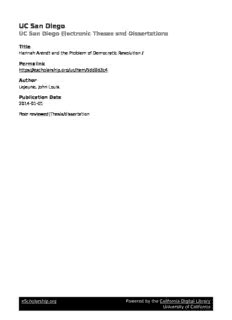Table Of ContentUC San Diego
UC San Diego Electronic Theses and Dissertations
Title
Hannah Arendt and the Problem of Democratic Revolution /
Permalink
https://escholarship.org/uc/item/5dd0d3c4
Author
LeJeune, John Louis
Publication Date
2014
Peer reviewed|Thesis/dissertation
eScholarship.org Powered by the California Digital Library
University of California
UNIVERSITY OF CALIFORNIA, SAN DIEGO
Hannah Arendt and the Problem of Democratic Revolution
A dissertation submitted in partial satisfaction of the
requirements for the degree Doctor of Philosophy
in
Political Science
John Louis LeJeune
Committee in charge:
Professor Tracy B. Strong, Chair
Professor Harvey Goldman
Professor Gerry Mackie
Professor Richard Madsen
Professor Philip Roeder
2014
Copyright
John Louis LeJeune, 2014
All rights reserved.
The dissertation of John Louis LeJeune is approved, and it is acceptable in
quality and form for publication on microfilm and electronically:
Chair
University of California, San Diego
2014
iii
Dedication
This dissertation is dedicated to the memory of my aunt,
Melanie Maria LeJeune (1965-2013),
who was a mother to all,
and to Wang Ke,
of two!
iv
Epigraph
The ceaseless, senseless demand for original scholarship in a number of fields,
where only erudition is now possible, has led either to sheer irrelevancy, the
famous knowing of more and more about less and less, or to the development of
pseudo-scholarship which actually destroys its object.
Hannah Arendt
1972
v
Table of Contents
Signature Page……………………………………………………………………………………….. iii
Dedication……………………………………………………………………………………………... iv
Epigraph………………………………………………………………………………………………... v
Table of Contents…………………………………………………………………………………… vi
Acknowledgements………………………………………………………………………………... vii
Vita………………………………………………………………………………………………………... viii
Abstract of the Dissertation….……………...…………………………………………………. ix
Chapter I: Revolutionary Narrative and the Twentieth Century………… 1
1. A Century Passed…………………………………………..……………………………………. 1
2. Ruptures in Time……………………………………………………………………….............. 6
3. Liberalism and Democracy………………………………………………………………….. 18
4. Wars, Revolutions, and Reactions………………………………………………………... 25
5. The Birth of Liberal Revolution…………………………………………………………… 37
6. Democracy and Orthodoxy………………………………………………………………….. 50
7. Home to Roost: Arab Spring, Occupy, and Revolutionary Action…………… 63
8. Hannah Arendt and the Study of Revolution………..........................……………… 78
Chapter II: Power and Political Order…………………………………...………….. 92
9. A Sociological Concept……………………………………………….................................. 93
10. Concert and the Gathering…………….......................................................................... 101
11. Potential and Plurality……….……..……………………………………........................... 112
Chapter III: The Problem of Revolutionary Leadership……………. ……..... 126
12. The Year of the Protestor………………………………………………………………….. 126
13. Representation and Res Publica……………………………………...…………………. 138
14. Picking up Power I:
Revolutionary Situations and Real Revolutionaries……………………….. 151
15. Lenin, Luxemburg, and Revolutionary Statesmanship………………………... 168
Chapter IV: Egypt’s Leaderless Revolution………………………………............. 189
16. The Election of Irony……………………………………………….………………………... 190
17. Picking up Power II: Movement and The Crisis of Egyptian Leadership.. 221
18. Thinking with Arendt: Modern Revolution and the Arab Spring………….. 255
Chapter V: Freedom and Utopia: Liberalism, Revolution,
and Violence…………….………………..…………...………...…………… 282
19. Utopia and the Liberal Cycle…………………………………………………………….... 283
20. Political Councils and the Lure of Violence………......……..……..…………….…. 306
Bibliography………………………………………………………………………………………… 325
vi
Acknowledgements
The number of schools I’ve attended in one form or another over the past
fifteen years has been a running joke in my family—UCSD, Bard College, National
Taiwan Normal University, Marquette University, University of Wisconsin-
Milwaukee, Boston University, the State University of West Georgia, and even a few
summer semesters at the University of Florida and Central Florida Community
College. And maybe it’s the Hegel talking, but looking back it all seems essential to
whatever this dissertation is, and whoever I’ve become in the process. The debts I’ve
accrued are of course enormous, and I can’t possibly do them justice here.
But if you’re reading this with anticipation you should probably expect a
letter—or in Ke’s case a really big gift—sometime soon.
* * * *
Large portions of “Chapter III: The Problem of Revolutionary Leadership”
were previously published in the article “Hannah Arendt’s Revolutionary
Leadership,” HannahArendt.net, Vol. 7, No. 1 (2013), pp. 1-25. An altered version of
“Chapter IV: Egypt’s Leaderless Revolution” will be published in a tentatively titled
article called “Picking up Power: Hannah Arendt and Egypt’s Leaderless Revolution,”
in Political Theory and the Arab Spring, ed. Brian Mello and Glenn Mackin,
Bloomsbury, anticipated publication 2015.
vii
Vita
B.A. Boston University Political Science 2003
M.A. Marquette University Political Science 2005
Junior Teaching Fellow, Hannah Arendt Center 2012-13
Bard College
Ph. D. University of California, Political Science 2014
San Diego
Publications
“Picking up Power: Hannah Arendt and Egypt’s Leaderless Revolution,” in Political
Theory and the Arab Spring, ed. Brian Mello and Glenn Mackin, Bloomsbury
(forthcoming 2015)
“Revolution,” The Encyclopedia of Political Thought. Michael T. Gibbons, Ed.
Indianapolis: Wiley-Blackwell, 2014.
“Genital Mutilation,” The Encyclopedia of Political Thought. Michael T. Gibbons, Ed.
Indianapolis: Wiley Blackwell, 2014.
“Hannah Arendt’s Revolutionary Leadership,” HannahArendt.net, Vol. 7, No. 1
(2013), pp. 1-25.
with Gerry Mackie, “Social Dynamics of Abandonment of Harmful Practices: A new
look at the theory.” Innocenti Working Paper 2009-06, Special Series on Social
Norms and Harmful Practices, UNICEF Innocenti Research Center, Florence,
May 2009.
viii
Abstract of the Dissertation
Hannah Arendt and the Problem of Democratic Revolution
by
John Louis LeJeune
Doctor of Philosophy in Political Science
University of California, San Diego, 2014
Professor Tracy Strong, Chair
In 2011 the wave of revolutionary upheavals in the Arab world and the
‘Occupy’ protests in the industrialized West together resurrected important
questions about the nature and morality of revolution that had faded from view
following the benign, non-violent “liberal revolutions” of 1989 in Eastern Europe. In
the troubled aftermath of 2011 and the chaos that followed the “Arab Spring,”
however, the novel alliance between political liberalism and democratic revolution
witnessed over the last quarter century has suddenly become doubtful.
ix
Description:This dissertation is dedicated to the memory of my aunt,. Melanie Maria LeJeune (1965-2013), who was a mother to all, and to Wang Ke, of two! 38 Thucydides, History of the Peloponnesian War. Trans. Rex Warner, New York: Penguin, 1972, esp. Book I, passim. 39 On why revolutions within states

